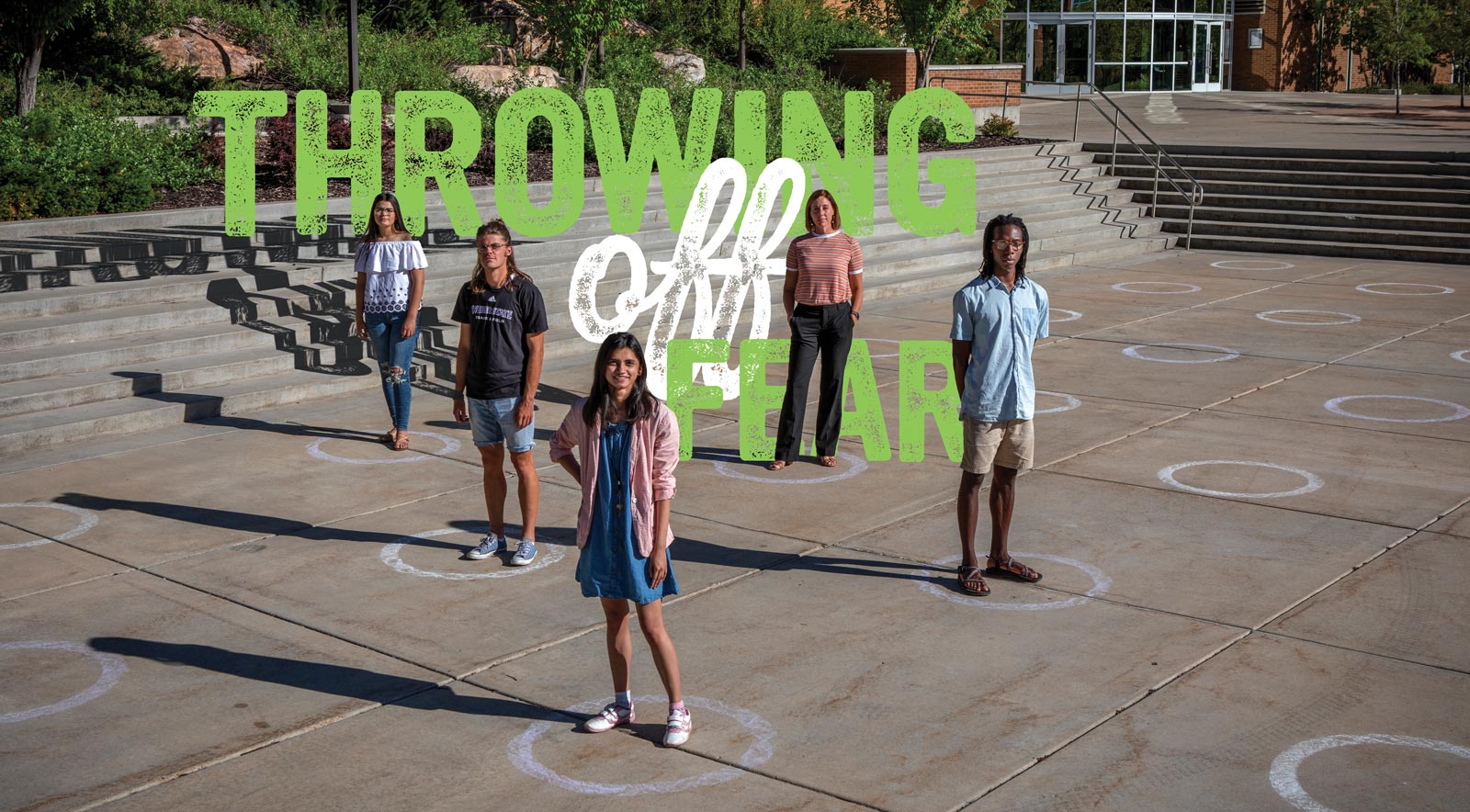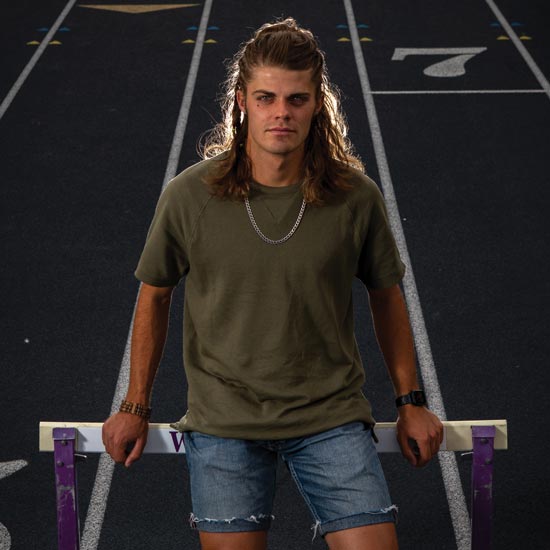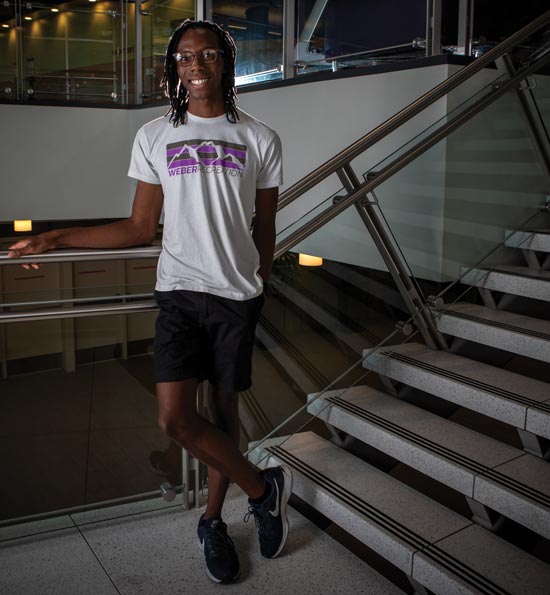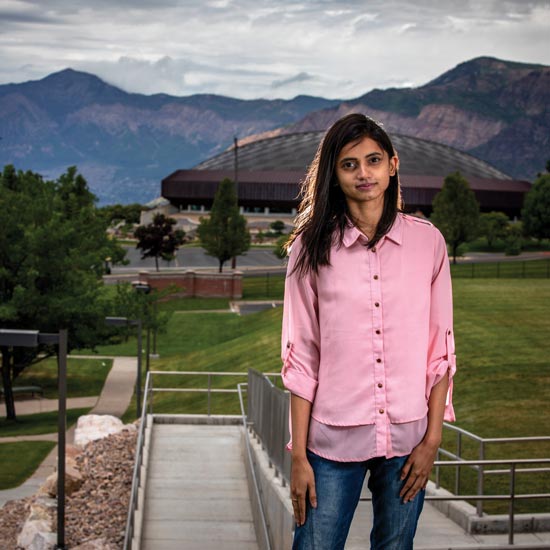Throwing off Fear: WSU Students

Jaime Winston, Marketing & Communications
The following student stories are one part of our Throwing off Fear feature article. Scroll to the bottom of this page for links to our other sections.
 Life is risky, and sometimes, it takes grit to pull through.
Life is risky, and sometimes, it takes grit to pull through.
When Colter Blanchard and five of his friends left for a ski trip last spring, they thought that risk was relatively low. The Steamboat Springs forecast called for light snow, dusting the resort town’s slopes with its signature light, fluffy “champagne” powder. While two COVID-19 cases would soon be reported in the surrounding county, Blanchard and his friends didn’t see news of any when they left home. With Weber State classes temporarily canceled, giving faculty time to move spring semester courses from in-person to online formats, the mid-March trip seemed perfectly timed — and it nearly was.
“We had a great trip, super fun,” said Blanchard, a mechanical engineering major and WSU track and field athlete.
Amid skiing, dining on pizza and laughing with friends in the picturesque town, the virus wasn’t at the top of Blanchard’s mind. After the trip, though, one of his ski buddies had bad news.
“He went to a routine checkup, and he told the doctor ‘I feel pretty fatigued, my chest is kind of tight,’” Blanchard recalled. “So, he got tested by chance, and his results came back positive.”
Blanchard realized his own exhaustion wasn’t just travel fatigue and was tested for COVID-19 on March 19, four days after returning to Utah.
He became the first Weber State student to report having the virus. Young and healthy, he was able to fight the virus better than some.
“I had a slight, very mild cough for about 12 hours. I had a very low-grade fever, but, overall, I would’ve classified it as a mild cold or mild flu, because I never felt seriously ill,” he said. “I did not want to spread it to any of my family or friends or loved ones, like my grandparents.”
He quarantined in his bedroom at his parents’ home in Farmington.
After three days of treating symptoms with NyQuil and a lot of water, he started feeling better. But the virus wasn’t the tough part.
“It was difficult for me to finish out my classes, not because I had the virus, rather because I missed the learning environment that a classroom provides,” said Blanchard, who took 13 credit hours.
Like Blanchard, Weber State students have battled hardships throughout the pandemic. Many lost jobs, many faced anxiety over family and friends, and some were unable to visit family.
Students pulled through amid adversity.
When doubt came, and darkness loomed, they threw off fear.
“This is something that we can control in our immediate circles,” Blanchard said. “We need to take it seriously, but I don’t think we need to be stopped in our tracks with fear.”
A Day’s Work
When Karen Valdez worked her last shift as a resident assistant at University Village in late April, it felt different.
“As an RA, the biggest thing we do is community building, so really interacting with our residents and creating activities where they can come together,” said Valdez, who spent two years as an RA before graduating with a bachelor’s degree in communication. With the onset of the COVID-19 pandemic, however, creating community in the halls came second to
keeping the residents safe.”
 RAs limited interactions with residents, and shared spaces were closed due to the pandemic. Valdez said the once-lively, energetic residence hall felt like a “ghost town” as more and more students left to go home during the second block of spring semester.
RAs limited interactions with residents, and shared spaces were closed due to the pandemic. Valdez said the once-lively, energetic residence hall felt like a “ghost town” as more and more students left to go home during the second block of spring semester.
She remembers her surprise seeing so many students pack up the day WSU announced that courses would go online.
“Wow, this is crazy, people are actually packing up and leaving already, and the semester is far from over,” she recalled thinking. “It was in that moment I knew the rest of the semester was going to be completely different and just be ready to expect anything.”
Though she knew the changes were necessary, she missed the one-on-one time she had with residents, helping them realize they belong at Weber State University, that they make the school great.
During finals weeks, Valdez found ways to encourage the few remaining students through gestures like dropping off puzzles and crosswords, or writing notes of positivity. “I like to think that those little actions helped my residents feel better, feel more at home,” she said.
Outside the residence halls, Valdez’s internship with the Real Salt Lake soccer team was on hold, and she had to find new ways to be useful in an on-campus internship where she once wrote press releases on campus events.
As a graduate, Valdez wishes she could have said goodbyes to peers and thank you to professors in-person before her final classes went online.
Amid the pandemic and rising tensions throughout the world, Valdez found sparks of inspiration in fellow Wildcats.
“My friend Dawn made a poll on Instagram about how students are still planning on celebrating graduation even though commencement was postponed, and she made this infographic that she shared with all the ways people submitted,” Valdez said. “Those positive little reinforcements really made this pandemic a lot more manageable.”
Looking Inward
Whether they know him by name or not, Weber State gym-goers could always expect a warm greeting from exercise and sport science major, Najite Achebo.
 Like Valdez, his on-campus job was impacted by COVID-19.
Like Valdez, his on-campus job was impacted by COVID-19.
Achebo, a Campus Recreation employee, greeted guests at the Wildcat Center gym last spring semester. “They call it ‘access,’” he said. “I just make sure everyone who’s coming in has their card and the proper clearance to get in.”
Of course, the job means more to him than just checking Wildcards.
“I met a ton of friends that I have become close with, just meeting them at the gym and talking to them as they come in, and getting to know them more and more,” he said in May, as many gyms closed. “That’s one aspect of the position I really enjoy and miss.”
Aside from having to leave the job, Achebo also had to adjust to spring
semester classes going online. Both shifts were a challenge.
“I definitely value regularity and routine like everyone else, but that huge abrupt shift to my schedule was pretty jarring,” he said. “I really struggled with staying on top of my school work and being self-reliant — getting everything done you could get done.”
While some classes didn’t translate as well to an online format, Achebo credits professors such as John Sohl for making the transition easier. “We did daily Zoom calls,” Achebo said. “He was on top of everything, and made the adjustment pretty well.”
Rather than give in to the fact that he no longer had a regular routine to follow, Achebo had to adjust the way he thought about the situation.
“I’m realizing ‘Wow, I have all this free time.’ I really ought to use it for something useful and good,” he recalled. “I really want to spend this summer with all this time that I have trying to better myself, and that’s been the motivation to go run, or go hike, or journal and meditate, to do stuff that I wanted to do with all this time I never had.”
One recent hike he won’t forget was in Logan Canyon.
“I’ve never been up there before,” he said last May. “It’s really beautiful, especially this time of year, super green.”
Achebo said his roommates and another position at a physical therapy clinic kept him grounded as life slowed down through social distancing. He also had a chance to look inward.
“A lot of people, especially with our society, are always in a go mode and always looking toward the next thing and what we can do to be productive and keep busy,” he said. “With this huge disruption, it’s like ‘Whoa, I don’t have to do that right now necessarily.’ I’ve been trying to use that time to be more introspective and think about who I am and who I want to be, what I want to do with my life.”
The Wildcat Center reopened its gym during the summer. Achebo plans to work the front desk this fall, with a smile for guests.
A Source of Strength
When asked how the COVID-19 pandemic has impacted her life, Denise Call says the easier question to answer would be how it hasn’t.
“It’s affected every aspect of my life,” Call said.
She started her communication degree 28 years ago, and continued school after having children, but had to put education on hold when her husband was accepted to a dental school across the country, during several family moves to new homes, and when she and her husband decided to again have children.
 She returned to school just over a year ago as a mother of seven.
She returned to school just over a year ago as a mother of seven.
Three of her children are Weber State graduates, and two are current students. During the latter half of spring semester 2020, Call began sharing desk space with her seventh and sixth grader to complete homework, as WSU classes and public schools went online.
More than once, she admits, she drove to Weber State’s Ogden campus to use the Wi-Fi and study from her car. “Once I learned that trick, that made a big difference in helping me get my tasks done,” she said.
While spring semester was a challenge, Call said instructors were compassionate and empathetic to students’ circumstances.
Getting a grip on her emotions was another matter.
“I have to really stay on top of my emotions so I don’t let them get carried away,” she said last spring. “There’s not a single hour of a single day that goes by that you’re not considering the pandemic and how it affects your life in one way or another.”
While her family’s health concerned her, she found herself worrying most about whether her two youngest children were missing key elements of their education while away from school, and if her husband’s dental business would weather the pandemic.
Additional stress came from keeping her children on a routine schedule, including schooling and sports, and helping her daughter plan a wedding in May. “The social distancing issue was the most impactful for me when I realized we were not having the same kind of wedding reception we’ve done for all our other kids,” she said. “Every aspect about this wedding is different.”
Even the wedding shower was different, held over Zoom.
To manage it all, she said she had to be flexible and accept that things had changed. Making it through everything the pandemic has thrown at her, Call is a Weber State University success story in the making.
And she’s now preparing for her next challenge. “I secretly, deep down inside, think I might pursue a master’s degree in communication at Weber,” she said. “I love the professors, I love the program, it’s close by, I’m really kind of addicted to education right now.”
Those closest to her were a source of strength. Recently, they helped her celebrate her 50th birthday with a “virtual party.” “My husband texted all of our friends and family, and he got video clips of them wishing me a happy birthday and put it together in a little video,” she said. “I gathered with my kids and did cake and ice cream, and we got to watch the video of all of our friends saying happy birthday.”
Falling we are lifted. Rising we lift each other.
Missing Home
Microbiology major Niharika Mishra returned home after the first block of summer semester to spend time with family last year.
This past summer, she stayed in University Village on Weber State’s Ogden campus. She still saw family, this time on FaceTime.
 Due to the COVID-19 pandemic, commercial passenger flights from the United States to India were suspended. Many international students, like Mishra, were unable to return home after spring semester.
Due to the COVID-19 pandemic, commercial passenger flights from the United States to India were suspended. Many international students, like Mishra, were unable to return home after spring semester.
“Out of India, it’s kind of hard,” she said. “The summers are a good time interval for all of us to spend some time with our family. It kind of refreshes us for the next semester.”
Missing home in New Delhi, Mishra made the most of her time in the residence halls with her suitemates, Connie and her service dog, Bear.
“I feel blessed to have them,” Mishra said. “Otherwise, it would have been so bad just staying inside alone and just studying.”
And she wasn’t the only one in her family stranded.
Her brother was at school in Philadelphia when India went into lockdown, and her father was restricted from returning home from an out-of-town business trip in India. “We all are spread out,” Mishra said. “I FaceTime them everyday, because I feel like it makes you feel like you’re at home, although you’re not so close.”
She spent her time in quarantine on homework, playing with Bear, cooking and trying to learn new skills online.
Though unable to travel, she understood the reasoning.
“Right now, I don’t want to go home,” Mishra said last May. “Maybe, in my travel, I might get the virus, and maybe I turn out to be asymptomatic and spread it to other people.”
While careful to avoid potentially spreading the virus, Mishra showed her fortitude as her typically hands-on courses like zoology and chemistry were moved online. Meanwhile, she and other Weber State residents in Wildcat Village were asked to relocate to University Village and her usual summer job, as a microbial technician, was unavailable.
Through it all, she found positive moments. “I enjoy that moment when you talk to five or six of your friends on Facetime, and they all share their experiences: what they’re cooking, if they’re trying a new recipe, if they’re trying a new skill or if they’re doing something new,” she said.
Eventually, she plans to earn her Ph.D. to become a research scientist.
Today, she exemplifies the resilience of a Wildcat.
A Silver Lining
Colter Blanchard, a runner in the mile, cross-country and 3,000 metres steeplechase, finished first in reported COVID-19 cases at Weber State.
Today, however, he says he feels “100 percent.”
While sick, he successfully avoided transmitting the virus. He said those whom he came in contact with tested negative.
And, perhaps, his experience with the virus can now help others.
“I’ve been able to donate blood for research for better testing and vaccines,” Blanchard said. “I’ve also been tested for antibodies to get certain tests approved by the FDA.”
Through it all, he came to a realization: Connections strengthen us.
“It is really unfortunate, all of the effects it’s having on the economy and peoples’ ways of life,” he said. “But since recovering, I spend a lot of time on a road bike, I spend a lot of time on the trails, and I’m noticing there’s a lot more people cultivating old talents or passions.”
“Whether it’s a good thing or bad thing, people are spending more time in their homes with their families,” he said.
“I think there’s, for sure, a silver lining.”
Other sections of our Throwing off Fear feature:
